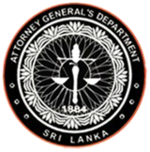| Attorney General of Sri Lanka | |
|---|---|
 | |
| Attorney General's Department | |
| Style | The Honourable |
| Nominator | President of Sri Lanka |
| Appointer | The president with Constitutional Council advice and consent |
| Term length | No fixed term |
| Formation | February 19, 1801 |
| First holder | James Dunkin as Advocate Fiscal of Ceylon |
| Deputy | Solicitor General of Sri Lanka |
| Website | www |
| This article is part of a series on the |
| Politics of Sri Lanka |
|---|
 |
The attorney general of Sri Lanka is the Sri Lankan government's chief legal adviser, and its primary lawyer in the Supreme Court of Sri Lanka. The attorney general is usually a highly respected senior advocate, and is appointed by the ruling government. The current attorney general is Parinda Ranasinghe Jnr. The president does not have any power to make orders, mandatory or otherwise, to the attorney general. He heads the Attorney General's Department which is the public prosecutor.
Contents
- Appointment
- Powers and duties
- Salary and entitlements
- List of attorneys general
- See also
- References
- External links
Unlike the attorney general of the United States, the attorney general of Sri Lanka does not have any executive authority and is not a political appointee; those functions are performed by the minister of justice. The attorney general is assisted by the solicitor general of Sri Lanka and several additional solicitors general.